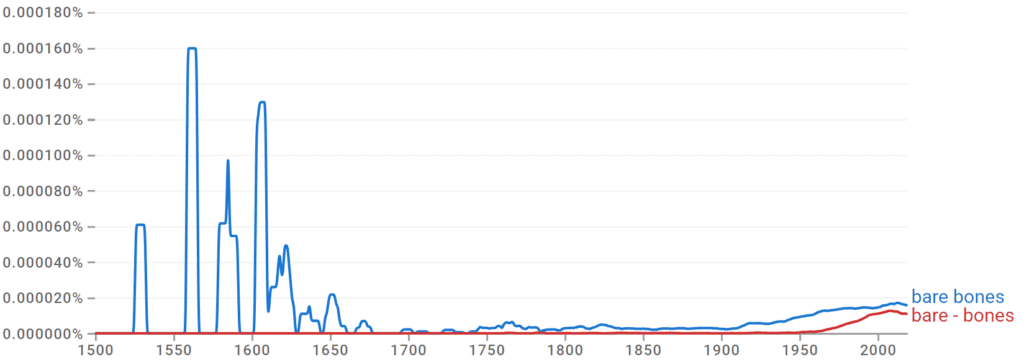Idioms are figurative words and phrases that help define and clarify speech and text. They offer allegorical, metaphorical or symbolic explanations to convey an author’s intended message. However, they can sometimes be confusing.
The idiom bare bones originates from Shakespeare’s time and stems from a literal use to describe a person’s physique. But, it has taken on a more figurative meaning through the years. Today, it is used to describe something basic or lacking detail.
Let’s learn about the term’s proper use and origins below.
What Is the Meaning of Bare Bones?

Bare bones is a plural noun that defines the essential components or most basic pieces of something without any frills or extraneous details. For example, if you request the bare bones of an idea, you wouldn’t want to hear about how somebody came up with the thought or how to implement and develop it. Instead, you would like to know only a summary of the idea.
Ways to use bare bones as a noun in a sentence.
- It was refreshing to see that the small town still stuck to the bare bones and did not overly develop the area, allowing it to keep its intimate feel.
- The company had to cut costs, so they focused on the bare bones of their operations.
Is Bare Bones One Word or Two Words?
Bare bones is written as two separate words. However, an early version of the word, Barebones, derived from a surname and used in a very particular way about the British Parliament. More on that history is explained below.
Besides this one instance, the plural noun is always used as a two-word term: bare bones.
When Is Bare Bones Hyphenated?
Like most nouns, the term can also serve as an adjective to help modify or describe another noun. When used as a compound modifier before a noun, bare bones is spelled with a hyphen: bare-bones.
Synonyms for the adjectival use include austere, plain, minimal, unadorned, rustic and spare.
For example:
- The report provided a bare-bones overview of the project.
- They presented a bare-bones budget proposal.
- The tour was truly a bare-bones experience, but he felt that it allowed him to understand better what had happened since all opinions were left out of the conversation.
Origin of the Term Bare Bones

Although it is possible the idiom was used before our first documented use of it, it was none other than the master of new words himself, Shakespeare, that first used it in print. The term appears as a hyphenated noun in “Henry IV,” published in 1598.
In this example, Shakespeare used it in a literal sense as another name for Falstaff, a man lacking in both appearance and ethical demeanor. Falstaff is an overweight character marked by hypocrisy, narcissism, boastfulness and intelligence. Since Shakespeare was a master of verbiage, it is likely he was also creating an allusion through his word choice to allow his audience insight into the type of man Falstaff truly was:
Here comes lean Jack, here comes bare-bone. / How now, my sweet creature of bombast! / How long is’t ago, Jack, since thou sawest thine own knee?
The term came to mean a skinny person, literally. However, with the introduction of the Barebones Parliament in 1653, the word began to take on more popular figurative usage.
A Barebones Parliament meant to run the government on a small, carefully chosen group of individuals. The name was derived from a member, Praise-God Barbon, a strict Puritan who believed in radical legal reform alongside a basic structure in politics and religion. Barebones sounds much like the pronunciation of Barbon.
Whether purposeful or by design, the name took hold in a figurative sense and has been used as a noun ever since. The adjective bare-bones came into more popular use in the 1940s.
Let’s Review
Bare bones is a plural, two-word noun used to describe the most basic components of something without providing specific details.
As an adjective, bare bones describes something simple, despite its more literal origins used to describe a person of thin stature.
Shakespeare hints at illusionary usage. Its ironic similarity to a political and religious figure in British Parliament supports its modern figurative usage to help modify something as lacking frills and technicalities.
Related Article:
